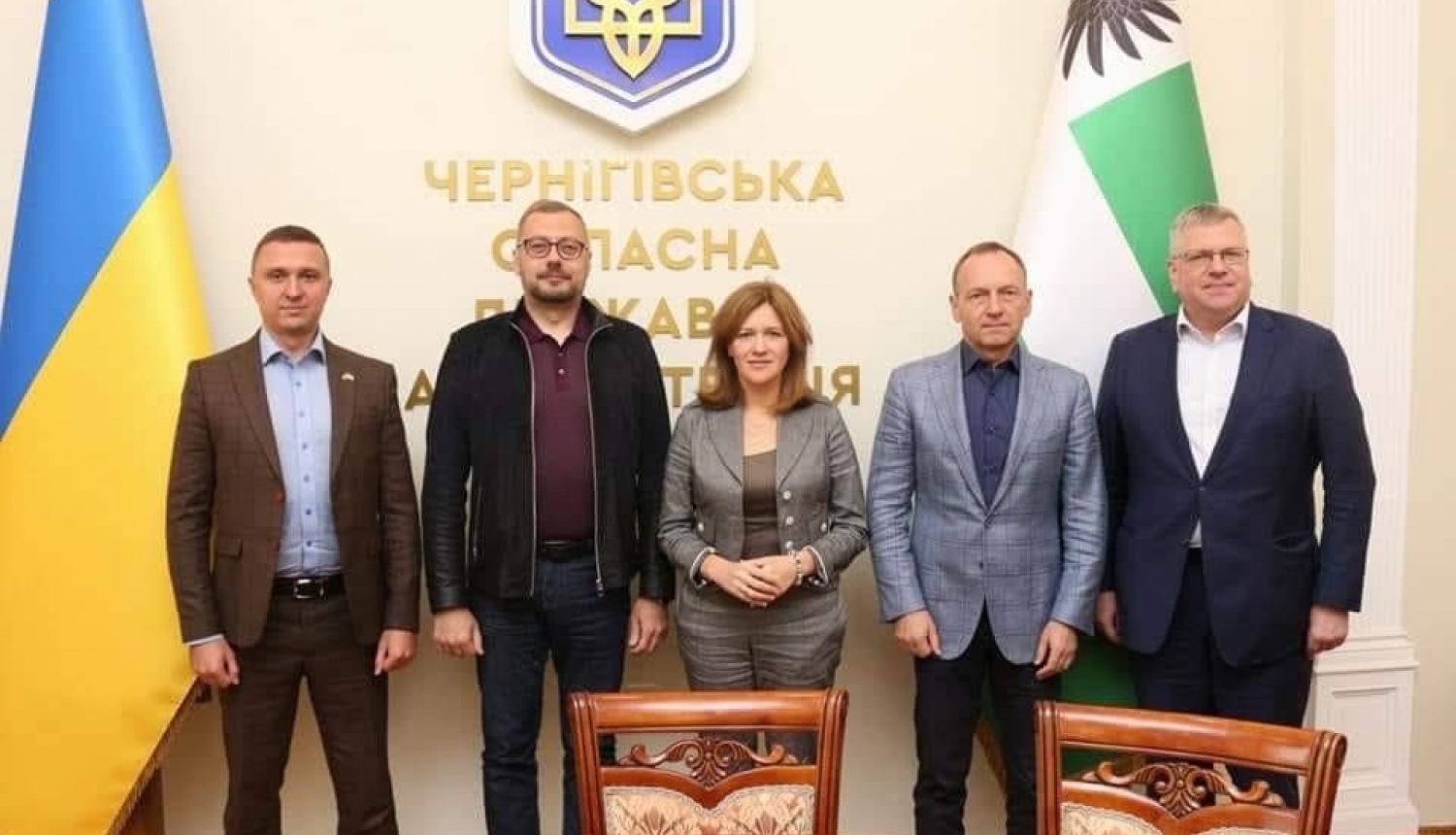On 7 September 2022, the Parliamentary Secretary of the Ministry of Foreign Affairs, Zanda Kalniņa-Lukaševica, visited Chernihiv Oblast and met with the senior officials of the region – the Governor of Chernihiv Oblast, Viacheslav Chaus, the Mayor of Chernihiv, Vladislav Atroshenko, and the Mayor of Nizhin, Oleksandr Kodola, for a discussion on Latvia’s involvement in the reconstruction of the region and on urgent needs for assistance. The Parliamentary Secretary also met with the residents of Chernihiv and saw destruction caused by Russia’s aggression, including facilities that must be urgently rebuilt.
During the meeting, Zanda Kalniņa-Lukaševica informed the Ukrainian officials about a decision adopted by the Latvian Cabinet of Ministers on 6 September to provide support for the reconstruction of Chernihiv Oblast.
The Parliamentary Secretary noted: “Latvia and Chernihiv Oblast are linked by long-lasting and close ties. The Latvian Government has made a decision to contribute to the reconstruction of Chernihiv Oblast. I am here to listen to your needs. Latvian society as a whole – the state, local authorities, businesses and civil society – have already been providing support, also by donating goods, which reached Ukraine and Chernihiv Oblast as humanitarian aid. Now we are set on providing assistance and contributing to Ukraine’s recovery, especially in preparations for winter so that the most urgent work on housing could be completed in time, before the start of the heating season.”
The Governor of Chernihiv Oblast, Viacheslav Chaus, thanked the Latvian Government and people for support that has been provided through both sending humanitarian aid to Ukraine and receiving Ukrainian families in Latvia. In view of the main losses – 90% of total damage – having been caused to civilian infrastructure by the Russian invasion, the governor named civilian housing as the priority in reconstruction efforts. Viacheslav Chaus pointed out that it was vital to build back Ukraine’s economy; therefore, support was needed for the resumption of business activity and for job creation, especially in food industry, heavy engineering, light industry, and information technologies.
In the very first days of war, Russian troops also invaded Chernihiv Oblast. The city of Chernihiv and the region have suffered heavily. According to the governor, 500 people have died and 1000 injured in Russian attacks, 8200 sites and facilities have been destroyed or damaged, including 7,054 private homes and 202 education institutions, 90 health and social protection institutions, and 53 civilian infrastructure facilities. In Chernihiv Oblast, 125 schools and 63 medical institutions have been left in ruins; 1,512 km of transport infrastructure and 4,767 million square meters of residential space have been destroyed. The regional centre – the city of Chernihiv – endured a siege for almost a month.
The Mayor of Chernihiv, Vladislav Atroshenko, described damage inflicted to the city. The Mayor of Nizhin, Olexandr Koloda, characterised the conditions in his city and expressed gratitude for assistance provided by Latvia.
Zanda Kalniņa-Lukaševica underlined that Latvia would make every effort to support Chernihiv Oblast this year already, especially as preparations are made for winter, as well as carefully assessing all needs for the region’s urgent reconstruction next year. The Parliamentary Secretary noted that Latvia was planning to use funds in a strategic manner, including as a catalyser for mobilising external funding and building cooperation with other donors.
Members of the Chernihiv Oblast Administration showed evidence of barbarity perpetrated by Russia: damage to a social enterprise employing people with special needs, the destroyed youth and non-governmental organisations centre and a sports stadium in the centre of Chernihiv, apartment buildings left in ruins, and devastation caused to the village of Yahidne, the residents of which were trapped in a school basement for almost a month during the Russian occupation.
In Yahidne, the Parliamentary Secretary met with the head of the Ivanivsk hromada and the survivors of the Russian occupation. The Latvian delegation was also shown the school basement where 300 villagers, including babies and the elderly, were held in inhuman conditions for a month, two people per one square meter, civilians being subject to torture and humiliation and killed by the Russian military. This community, bonded by the horrors they had experienced, needs support for the restoration of several residential buildings so that people would have warm homes with the onset of winter.
“After going down in this basement just for a brief moment and having heard the stories of the survivors, it seems that we have had a glimpse of hell. No words could describe the horror that people experienced here. At the same time, the courage and spiritual strength of each individual survivor deserve admiration. We want to help restore this village and see it full of life again. We have heard the request to help obtain the acutely needed building materials so that locals could complete the necessary works with the aid of volunteers, and we hope to find the way to engage assistance from Latvia,” the Parliamentary Secretary told the head of the hromada and local people.
Background information
To facilitate an effective and coordinated reconstruction of the country, the Ukrainian President and Prime Minister have called on each donor country to choose one particular oblast on which to focus their assistance. On 6 September, the Cabinet of Ministers of Latvia approved an informational report prepared by the Ministry of Foreign Affairs and suggesting Chernihiv Oblast as the main recipient of Latvia’s assistance. An Honorary Consul of Latvia, Olena Vyshnyakova, is working in Chernihiv Oblast; in addition, Latvia has close political contacts with the region, including at the local government level. Several Latvian companies are operating in the region. A number of development cooperation project have been implemented there since 2007. By joint efforts of civil society, local governments and businesses, several deliveries of humanitarian aid have been sent to the region since the beginning of the war.
Chernihiv Oblast has a 225 km border with Russia and a 232.6 km border with Belarus.




